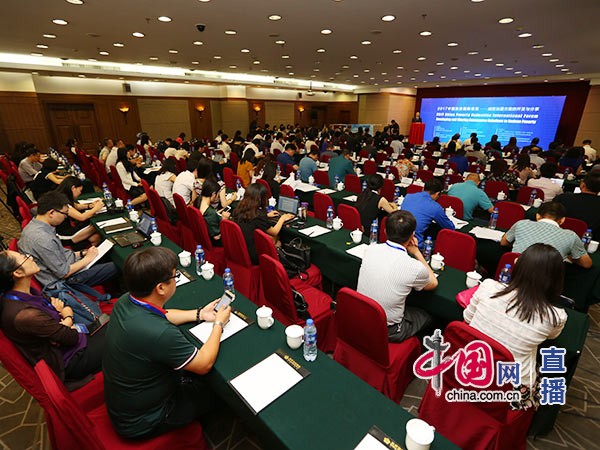World's 1st poverty reduction database in tree diagrams
- By Zhang Rui
 0 Comment(s)
0 Comment(s) Print
Print E-mail China.org.cn, May 26, 2017
E-mail China.org.cn, May 26, 2017
|
Officials and representatives from international organizations, embassies as well as businesses launch the Global Poverty Reduction Online Knowledge Sharing Database in Beijing, May 26, 2107. [Photo/China.org.cn] |
The Global Poverty Reduction Online Knowledge Sharing Database was launched on Friday at the 2017 China Poverty Reduction International Forum in Beijing being attended by officials and representatives from international organizations, embassies as well as businesses.
Created by the Global Poverty Reduction & Inclusive Growth Portal (GPIG), the database (http://case.iprcc.org.cn/) is a platform to share successful models of poverty reduction from both China and the international community, which is distinguished by its use of tree diagrams, standardized templates and a strong network of contributors.
Designed for worldwide use, its systematic presentation of poverty alleviation cases is unprecedented. Through the use of the tree diagrams, it provides a clear depiction of how China and other international bodies are seeking to address the problem, in particular focusing on cases with a high degree of technical applicability for various countries. To facilitate social participation, the platform contains a guide to help users upload cases in standard templates.
The Chinese poverty reduction cases are divided into three categories: market-oriented, government-led, and community-driven. The international cases are classified as poverty reduction through increasing opportunities, improving human capital and capacity, and through reducing vulnerability. Each has various subcategories.
By analyzing factors impacting poverty reduction, the diagrams extract experiences in a more intuitive way, inspiring the international community, low-income nations in particular, to rapidly grasp specific successful practices so as to be able to learn from or even replicate them. It is hoped that the process will generate new solutions to poverty alleviation problems.
The database benefits from a strong network of contributors. While the International Poverty Reduction Center in China (IPRCC) is taking the lead on the Chinese side by leveraging its own resources and its partnerships with universities and research institutes, a raft of international organizations also play their part.
With major contributions from the World Bank, GPIG is also building strong partnerships with the Asian Development Bank (ADB) and the Food and Agriculture Organization of the United Nations (FAO). The public are also encouraged to upload cases that they believe could be valuable.
As a systematic project, it is planned to summarize new poverty alleviation strategies, develop new representative cases, and add them to the database on a regular basis in the future. It is expected that, after years of efforts, the database will evolve into a knowledge-sharing center in the fields of poverty reduction and south-south cooperation.
China has recorded tremendous achievements in poverty alleviation by lifting more than 700 million people out of backwardness. However, there is a lack of comprehensive or systematic publicity of China's experience in the existing research.
Meanwhile, in the process of building a well-off society in an all-round way, China has been constantly exposed to new challenges. Hence, it is necessary to build an exchange platform that provide China with successful models from the international community while introducing China's own achievements to the world.
The Global Poverty Reduction Online Knowledge-sharing Database has transformed GPIG from an information sharer into a producer, which was officially launched at the forum last year. Initiated by the World Bank and supported by ADB, it is co-hosted and co-managed by IPRCC and China Internet Information Center (CIIC).
With one year of development, the portal now brings together information from different sources in a standardized way, promoting knowledge-sharing online and offline. It contributes to the successful achievement of the Sustainable Development Goals (SDGs) as well, gaining a positive response from the poverty reduction community.







Go to Forum >>0 Comment(s)